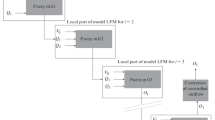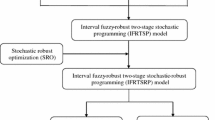Abstract
Fuzzy multiobjective decision makingmodels generally rely on the aggregation of theobjectives to form a decision function. The generalizedaveraging operator is usually adopted for aggregatingmultiple and unequal objectives because it allows trade-off amongst the objectives, and has been shown to besuitable to model human decision making behavior. In thefield of water resource management, most of the decision-making problems involving the generalized averagingoperator implicitly assume the decision maker (DM) israther optimistic. The analysis of the DM's behaviorduring the aggregation process and its impact on theperformance of the system, has therefore never beenaddressed by many researchers and decision makers. Theaim of this paper is to investigate the relationshipbetween decision makers' index of optimism and the long-term performance of a reservoir resource. Morespecifically, the generalized averaging operator, whoseparameter can be interpreted as the DM's index ofoptimism, is imbedded into a fuzzy stochastic dynamicprogram (FSDP). This approach is developed andimplemented to derive optimal operating policies for thehydroelectric complex of the Uruguay River basin inSouthern Brazil. FSDP-derived policies with differentindices of optimism are then compared with simulation. Weshow that system performance may be influenced by thedecision maker's behavior during the aggregation, andthat the optimistic assumption may not yield tosatisfactory results, especially during critical timeperiods.
Similar content being viewed by others
References
Bárdossy, A., Bogardi, I. and Duckstein, L.: 1991,‘ Fuzzy regression in hydrology’, Water Resources Research 26(7), 1497–1508.
Bellman, R. and Zadeh, L.: 1970, ‘Decision making in fuzzy environment’, Manage. Sci. 17(4), 209–215.
CEPEL-Centro de Pesquisas de Energia Eléctrica: 1999, Determinacão de Coordenacão da Operacão a Curto Prazo (DECOMP) – Especificacão Funcional.
Choo, E., Schoner, B. and Wedley, W.: 1999, ‘Interpretation of criteria weights in multicriteria decision-making’, Computers & Industrial Engineering 37, 527–541.
Datta, B. and Burges, S. J.: 1984, ‘Short-term, single, multiple-purpose reservoir operation: importance of loss functions and forecast errors’, Water Resources Research 20(9), 1167–1176.
Dubois D., Fargier, H. and Prade, H.: 1995, ‘Fuzzy constraints in job-shop scheduling’, Journal of Intelligent Manufacturing 6, 215–234.
Dubois, D. and Fortemps, P.: 1999, ‘Computing improved optimal solutions to max-min flexible constraint satisfaction problems’, European Journal of Operational Research 118, 95–126.
Esogbue, A. O. and Kacprzyk, J.: 1998, Fuzzy Dynamic Programming, in: Handbook of Fuzzy Sets Series, vol 5: Decision Analysis in Operations Research and Statistics, Kluwer Academic Publishers, Boston, pp. 281–307.
Fontane, D. G., Gates, T. K. and Moncada, E.: 1997, ‘Planning reservoir operations with imprecise objectives’, J. Water Resour. Plann. Manage. 123(3), 154–163.
Hjorth P., Kundzewicz, Z. W., Kuchment, L. S. and Rosbjerg, D.: 1998, Critiques of Present Reservoirs, in: Sustainable Reservoir Development and Management (IAHS Publication no. 251, Wallingford, UK).
Johnson, S. A., Stedinger, J. R. Shoemaker, C. A. Li, Y. and Tajada-Guibert, J. A.: 1993, ‘Numerical solution of continuous-state dynamic programs using linear and spline interpolation’, Operation. Research. 41(3), 484–500.
Kacprzyk, J.: 1997, Multistage Fuzzy Control, John Wiley & Sons Ltd, Chichester, England.
Kaymak U. and van Nauta Lemke, H. R.: 1998, ‘A sensitivity analysis approach to introducing weight factors into decision functions in fuzzy multicriterion decision-making’, Fuzzy Sets and Systems 97, 169–182.
Kelman J., Stedinger, J. R., Cooper, L. A., Hsu, E. and Yuan, S.: 1990, ‘Sampling stochastic dynamic programming applied to reservoir operation’, Water Resources Research 26(3), 447–454.
Loucks, D. P.: 2000, ‘Sustainable water resources management’, Water International 25(1), 3–10.
Nicklow, J. W.: 2000, ‘Discrete-time optimal control for water resources engineering and management’, Water International 25(1), 89–95.
Pereira, M.: 1989, ‘Optimal stochastic operations of large hydroelectric systems’, Electrical Power & Energy Systems 11(3), 161–169.
Pereira, M.: 1998, Application of Economic Theory in Power System Analysis – Competition for Contracts in a Hydrothermal System, VI Symposium of Specialists in Electric Operational and Expansion Planning.
Saaty, T. L.: 1980, The Analytic Hierarchy Process, McGraw-Hill, New-York.
Shabman, L. and Stephenson, K.: 2000, ‘Environmental valuation and its economic critics’, J. Water Resour. Plann. Manage. 126(6), 382–388.
Stedinger, J. R., Sule, B. F. and Loucks, D. P.: 1984, ‘Stochastic dynamic programming models for reservoir operation optimization’, Water Resources Research 20(11), 1499–1505.
Teegavarapu, R. S. V. and Simonovic, S. P.: 1999, ‘Modeling uncertainty in reservoir loss functions using fuzzy sets’, Water Resources Research 35(9), 2815–2823.
Tejada-Guibert A., Johnson, S. A. and Stedinger, J. R.: 1993, ‘Comparison of two approaches for implementing multireservoir operating policies derived using stochastic dynamic programming’, Water Resources Research 29(12), 3969–3980.
Tilmant, A., Persoons, E. and Vanclooster, M.: 2001, Deriving Efficient Reservoir Operating Rules Using Flexible Stochastic Dynamic Programming, in: Proceedings of the First International Conference on Water Resources Management, WIT Press, UK.
Yager R.: 1978, ‘Fuzzy decision making including unequal objectives’, Fuzzy Sets and Systems 1, 87–95.
Yeh, W. W-G.: 1985, ‘Reservoir management and operations models: a state-of-the art review’, Water Resources Research 21(12), 1797–1818.
Zimmermann H.-J.: 1991, Fuzzy Set Theory and Its Application (2nd edition), Kluwer Academic Publishers, Norwell, Mass.
Author information
Authors and Affiliations
Corresponding author
Rights and permissions
About this article
Cite this article
Tilmant, A., Fortemps, P. & Vanclooster, M. Effect of Averaging Operators in Fuzzy Optimization of Reservoir Operation. Water Resources Management 16, 1–22 (2002). https://doi.org/10.1023/A:1015523901205
Issue Date:
DOI: https://doi.org/10.1023/A:1015523901205




